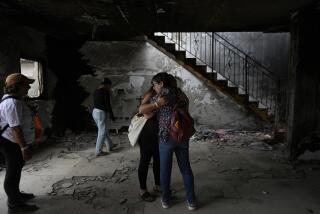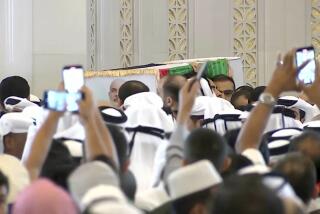As Ariel Sharon lies in state, Israelis pay their respects
JERUSALEM — Former Prime Minister Ariel Sharon’s casket, draped in Israel’s blue and white flag, made its way to Jerusalem on Sunday aboard a military command car in a somber motorcade flanked with police motorcycles and other military vehicles.
Carried by members of the Knesset guard as an army rabbi recited Jewish prayers, Sharon’s coffin was placed on a black dais set up in the plaza outside the parliament building. With flags at half-mast, a line of generals saluted the iconic soldier, who was also a divisive public figure.
President Shimon Peres and Yuli Edelstein, the speaker of parliament, laid wreaths by the coffin and left the plaza to citizens arriving to pay last respects.
At the Cabinet’s weekly meeting Sunday, government ministers stood and observed a minute of silence in Sharon’s memory. Prime Minister Benjamin Netanyahu said Sharon was “first and foremost a warrior and a commander, among the Jewish people’s greatest generals” throughout its history.
“He was tied to the land, he knew that it had to be defended. He understood above everything our revival is our ability to defend ourselves by ourselves,” the prime minister said.
In the Knesset courtyard, hundreds of people -- young and old, civilians and soldiers -- waited silently in line for a turn to salute, wipe a tear or mumble a quick verse and, in many cases, raise a cellphone for a quick picture.
Visitors included politicians past and present, spiritual leaders of religious denominations, Supreme Court judges and Ehud Olmert, who became prime minister in 2006 when Sharon suffered a massive stroke and never regained consciousness.
An official state ceremony is scheduled for Monday, after which Sharon will be buried beside his second wife, Lily, near his family farm in southern Israel. Officials were working out logistic and security concerns for Monday’s ceremonies, which will be attended by heads of state and other high-ranking officials.
Local media reported that the army is considering deploying an Iron Dome air defense battery in the area of the farm, which is a few miles from Gaza, where Palestinians celebrated Sharon’s death with sweets and parades.
Throughout the day, the Israeli news media continued blanket coverage that began with news of Sharon’s death Saturday, offering commentary from speakers deconstructing his complex character and trying to reconcile the ruthless soldier with the doting family man, the champion of Jewish settlements on occupied land with the man who uprooted some of those Jewish communities.
Danny Dayan, a spokesman for the settlement movement, fiercely opposed Sharon’s move to withdraw from the Gaza strip and remove thousands of settlers in the process, and denounced unilateral withdrawals as a “bankrupt policy.”
Sharon made many great moves but also tremendous mistakes, Dayan said in a television interview, adding that he prefers to remember Sharon before 2005.
Another speaker was Uri Avneri, a veteran journalist and peace activist who knew Sharon for decades. “Sharon was the father of the settlements, which visited disaster on Israel, but he also had no problem destroying settlements,” he said.
According to Avneri, Sharon held very broad views and was willing to zig-zag rather than stick to one particular doctrine, but always acted with some plan in mind. Sharon moved settlements around like chess pieces, Avneri said. “He was willing to sacrifice a bishop to save the queen.”
“For all his flaws, Israel is poorer without leaders like Ariel Sharon,” an editorial in the liberal daily Haaretz wrote Sunday. Since his departure, the paper wrote, the country lacks leadership that “acknowledges the limits of power, maintains its alliance with the U.S., displays courage in the territories and won’t be deterred by settlers.”
Sobelman is a special correspondent. Rushdi Abu Alouf in Gaza contributed to this report.
More to Read
Sign up for Essential California
The most important California stories and recommendations in your inbox every morning.
You may occasionally receive promotional content from the Los Angeles Times.










